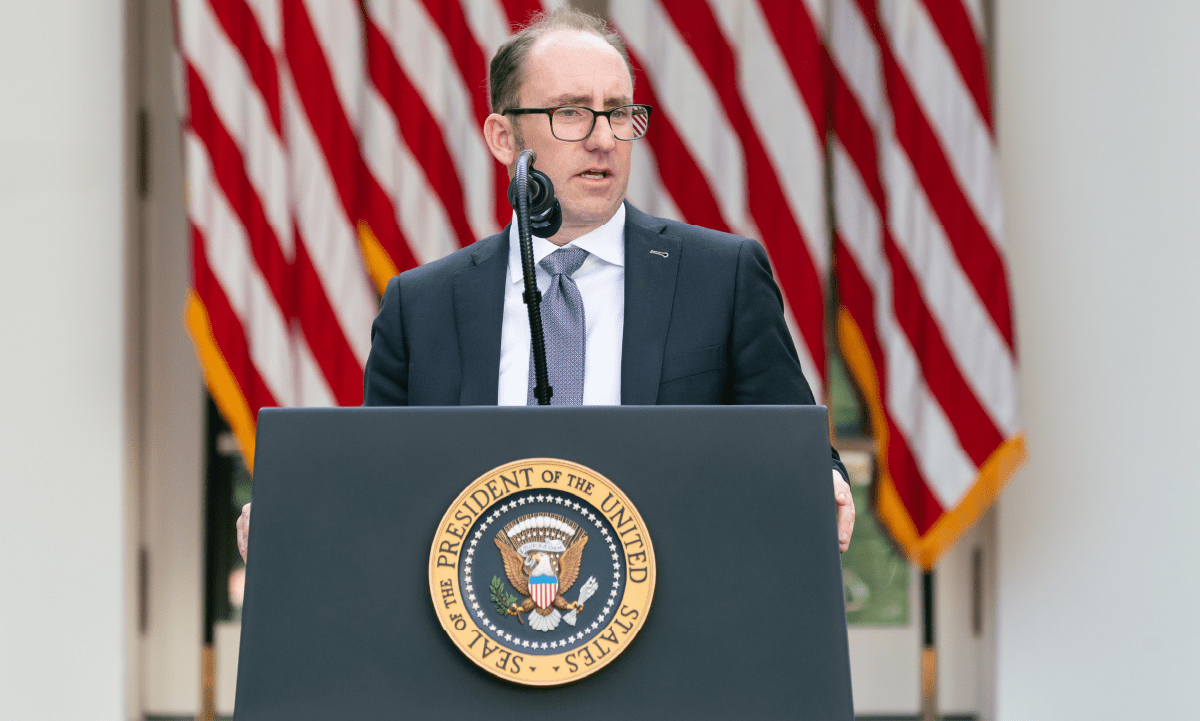
NACDS Chairman of the Board Richard Ashworth, president of Walgreens, in a press briefing held in the White House Rose Garden.
At the White House yesterday, NACDS Chairman of the Board Richard Ashworth, president of Walgreens, lauded the dedication and professionalism of pharmacists serving in communities throughout the nation. Remarks of Ashworth and of the leaders of four other NACDS member companies signaled ongoing expansion of COVID-19 testing through public-private partnerships, and were delivered amid states’ progress in removing remaining barriers so registered pharmacists may order and administer the tests seen as vital to public health and to re-igniting the economy.
In addition to Ashworth, NACDS Past Chairman Larry Merlo, president and CEO of CVS Health; Rodney McMullen, chairman and CEO of The Kroger Co.; Heyward Donigan, president and CEO of Rite Aid Corporation; and Doug McMillon, president and CEO of Walmart joined President Trump, Vice President Pence, other members of the Coronavirus Task Force, and other business leaders at a meeting in the White House Cabinet Room and a press briefing in the Rose Garden.
“As a pharmacist, I’m really proud to be part of this profession. And not just Walgreens pharmacists and pharmacy employees, but all of them, across grocery, mass, independents. You’re really doing what you should be doing and what you went to school for: to help patients, counseling them on their medicines, and helping them understand the problems that we’re facing,” Ashworth said at the press briefing in the Rose Garden.
“Pharmacy is right here in it with everyone, together in the community, and we look forward to being part of the testing like we are now; serology, whatever that might look like in the future; and eventually treatment when the vaccine does come.”
[perfectpullquote align=”full” bordertop=”false” cite=”” link=”” color=”” class=”” size=””]”As a pharmacist, I’m really proud to be part of this profession. And not just Walgreens pharmacists and pharmacy employees, but all of them, across grocery, mass, independents. You’re really doing what you should be doing and what you went to school for: to help patients, counseling them on their medicines, and helping them understand the problems that we’re facing.”[/perfectpullquote]
While these company leaders described the further expansion of COVID-19 testing through public-private partnerships with the Administration and with governors, other developments are increasing the empowerment of more pharmacies and pharmacists to engage further in COVID-19 testing. As a result of the Trump Administration’s guidance on April 8 and subsequent actions by governors, federal and state barriers continue to be removed to empower licensed pharmacists to order and administer tests authorized by the Food and Drug Administration.
Also on Monday, a significant milestone was achieved as more than half of the states now have taken action to remove remaining barriers such that registered pharmacists can order and administer COVID-19 tests. On Friday and Saturday, respectively, Florida and New York took such action. Already this week, Alabama, Mississippi and Kentucky have taken action as well. NACDS’ member portal for pandemic resources includes a series of maps that track states’ progress on these and other barriers.
Reinforcing his Administration’s intent to assure pharmacists have the ability to order and administer the tests, President Trump said in the Rose Garden, “I directed our Medicare program to make it easier for seniors to get the testing that they need. And the pharmacies — as you know, we are allowing pharmacies now to do testing. And we have other testing locations that we’re going to be allowing also, but having pharmacies get involved in testing is a very big deal. We’re also asking governors to do the same in their Medicaid program. So they’re going to be able and authorized to do the same in Medicaid. So it’s a big — that’s a big deal.”
In reacting to the day’s events, NACDS President and CEO Steven C. Anderson, IOM, CAE, said, “As testing supplies become more and more available, the scale that pharmacies and pharmacists can bring to this situation will be key. You will see pharmacies partnering with employers in mobile testing locations to help Americans get back to work. You will see similar facilities reaching out to underserved and social vulnerability communities. Essentially, you will see pharmacies and pharmacists doing for COVID-19 response what they have done for a long time on a host of health and wellness issues.”